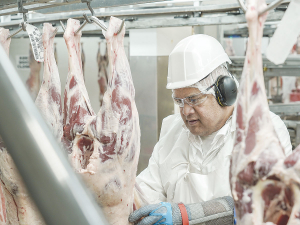US, EU and UK drive NZ red meat export boom to $827m
According to analysis by the Meat Industry Association (MIA), New Zealand red meat exports reached $827 million in October, a 27% increase on the same period last year.
 B+LNZ’s latest mid-season update says the fundamentals in key red meat markets are solid, with demand projected to continue to exceed supply.
B+LNZ’s latest mid-season update says the fundamentals in key red meat markets are solid, with demand projected to continue to exceed supply.
The outlook for global sheepmeat and beef trade is positive for the 2021-22 season, according to Beef + Lamb New Zealand’s (B+LNZ) latest mid-season update.
While this is encouraging for on-farm returns, there is also a real danger that growing inflationary pressures will see costs of farm inputs rise substantially and erode profits.
The report says the fundamentals in key markets are solid, with demand projected to continue to exceed supply.
“Strong demand from the US and China has underpinned record highs in the first quarter of the season for both sheepmeat and beef returns,” says B+LNZ’s chief economist Andrew Burtt. “And a tightening of global beef supply has added fuel to the global beef market.”
Total combined sheepmeat and beef export receipts for the 2021-22 season are forecast to lift 11% on 2020-21 to $9.6 billion and be 21% higher than the five-year average. Red meat export returns reached record highs in the first quarter of the season.
“The positive market sentiment is supported by the outlook for the NZ dollar, which is favourable for NZ exporters,” Burt says. “A greater proportion of the strong prices in New Zealand’s export markets is expected to flow into farm-gate returns.”
Despite this optimistic view, B+LNZ warns that the global red meat trade faces several key challenges in 2022.
These include ongoing pandemic uncertainty, continuing supply chain disruption – including high freight costs – the impact of tightening monetary policy in key markets on consumer demand and the sensitivity of agricultural trade to geopolitical tensions.
“Inflationary pressure is, however, causing on-farm costs to lift sharply, eroding the benefit of higher farm-gate returns,” Burt adds.
Farm profit before tax is forecast to lift 29% in 2021-22 to an average $116,200 per farm (inflation-adjusted).
“This increase is positive for farmers and is an improvement on lower profitability levels in 2020-21,” he explains. “However, inflationary pressure is causing on-farm costs to lift sharply, eroding the benefit of higher farm-gate returns.”
B+LNZ is expecting farm expenditure to increase 4.5%, with increased costs across most categories on farm and a sharp lift in fertiliser prices.
“While farm-gate prices for sheep and cattle boost profitability,” Burt explains. “Farmers are wary about the impact of the Omicron variant of Covid-19 on processor space and their ability to move livestock off-farm when finished, as well as the possibility of holding livestock for longer and needing additional feed.”
Meanwhile, the update also highlights how farmers remain concerned about the speed of increasing environmental regulation and the encroachment of carbon forestry businesses changing the landscape of rural communities.
The 5+ A Day Charitable Trust has launched a collection of affordable recipes designed to turn everyday vegetables into seasonal stars.
Jane Mellsopp has been confirmed as the new Government Appointee to the New Zealand Meat Board (NZMB).
To celebrate the tenth anniversary of its annual Good Deeds competition, Rabobank will give away $100,000 to improve rural community hubs, schools, clubrooms, and marae across New Zealand.
Agricultural and veterinary product supplier Shoof International has appointed Michaela Dumper as its new chief executive.
Federated Farmers is celebrating following the Government's announcement that young farmers will be able to use their KiwiSaver funds to buy their first home or farm.
The Meat Industry Association of New Zealand (MIA) today announced that Chief Executive Officer Sirma Karapeeva has resigned from the role.

OPINION: A mate of yours truly reckons rural Manawatu families are the latest to suffer under what he calls the…
OPINION: If old Winston Peters thinks building trade relations with new nations, such as India, isn't a necessary investment in…